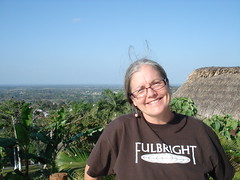So, it's official. I'm excited to say that I will be acting as a Fulbright Ambassador for 2012-14 and maybe even longer. I get to do what come easily for me...talk about the Fulbright program, what my experiences were like and how the Fulbright affected my life and the lives of my family. This is a start:

I'm writing this for you scholars who read this TED Fellows blog. Chances are you’ve thought about applying for a Fulbright scholarship but for whatever reason, you haven’t. It’s never the right time in your life. It’s never the right place in the world. You can’t take the kids with you. You can’t get the time off of work. You don’t teach, do research, work at an elite institution. You don’t have a Ph.D. You’re a biologist and they only want humanists. You’re an art historian and they only want scientists. All of these are fallacies. All of these excuses are known to CIES, the organization that oversees the Fulbright program, as roadblocks that keep you scholars from applying for a Fulbright.
Recently, I was invited to be a Fulbright Ambassador for 2012-2014 and that means CIES has asked me to talk up my Fulbright experience and, hopefully, inspire a diverse and wide-ranging applicant pool. Here goes!
The story of my road to a Fulbright grant starts with a master’s degree in geology. When I submitted my application for a Fulbright scholarship, I was working at a small liberal arts college as an educational technologist specializing in GIS. I was not then nor am I now a professor, though I did my share of college teaching as an adjunct. I’ve given lots of conference talks and written a few papers. I am what is known as an alternative-career academic or in twitter parlance I’m an #alt-ac. If I can do it, if I can secure a Fulbright grant, you can certainly do it too.
Here is what you absolutely need for a viable Fulbright application: 1) a desire to live in another country sharing your knowledge, traveling as a citizen-diplomat, 2) a project idea that jumps off the page and is readable by informed non-specialist reviewers, 3) an institutional contact in the country for which you are applying to, 4) if you desire a teaching award, you need teaching experience, and 5) if you seek a research-based award, you should have research experience. That’s kind of it. Here are more ideas for your application that I’ve developed in the past.
My Fulbright was spent at the Centre for Resource Management and Environmental Studies or CERMES at the University of the West Indies in Barbados. I did geospatial and GIS research, co-taught a GIS class, contributed to the department ‘s community outreach, worked with the one instructional technologist at the UWI giving seminars, I wrote a paper from one of the projects that I worked on, which is in press. I went to Belize to assist students and faculty with blogging, tablet PCs and video in a field-based class and I went to the Grenadine Islands to give Google Earth community workshops. My family and I lived in Barbados for eleven months where my kids learned how to sail, seek baby sea turtles, swim with the Alpha Sharks swim club, surf and snorkel. My wife (who is a professor and was on sabbatical) wrote every day and learned how to windsurf. I wrote four additional papers, learned more about the quirky (to an American) game of cricket and took thousands of pictures. I was nurtured, needed and warmly accepted into the CERMES family. The Fulbright experience was positively life-changing for me and my family.
If you’ve ever thought about a Fulbright, now is the time to give it a try. Why wait? Here is the catalogue and see for yourself. Get going, the application is due August 1, 2012.
Here is what you absolutely need for a viable Fulbright application: 1) a desire to live in another country sharing your knowledge, traveling as a citizen-diplomat, 2) a project idea that jumps off the page and is readable by informed non-specialist reviewers, 3) an institutional contact in the country for which you are applying to, 4) if you desire a teaching award, you need teaching experience, and 5) if you seek a research-based award, you should have research experience. That’s kind of it. Here are more ideas for your application that I’ve developed in the past.
My Fulbright was spent at the Centre for Resource Management and Environmental Studies or CERMES at the University of the West Indies in Barbados. I did geospatial and GIS research, co-taught a GIS class, contributed to the department ‘s community outreach, worked with the one instructional technologist at the UWI giving seminars, I wrote a paper from one of the projects that I worked on, which is in press. I went to Belize to assist students and faculty with blogging, tablet PCs and video in a field-based class and I went to the Grenadine Islands to give Google Earth community workshops. My family and I lived in Barbados for eleven months where my kids learned how to sail, seek baby sea turtles, swim with the Alpha Sharks swim club, surf and snorkel. My wife (who is a professor and was on sabbatical) wrote every day and learned how to windsurf. I wrote four additional papers, learned more about the quirky (to an American) game of cricket and took thousands of pictures. I was nurtured, needed and warmly accepted into the CERMES family. The Fulbright experience was positively life-changing for me and my family.
If you’ve ever thought about a Fulbright, now is the time to give it a try. Why wait? Here is the catalogue and see for yourself. Get going, the application is due August 1, 2012.